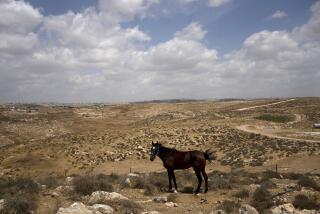Palestinian eviction threat comes at a sensitive moment
Reporting from Jerusalem — A threat to evict about three dozen Palestinians this week from their East Jerusalem homes to allow Jewish landowners to build housing in an Arab-dominated neighborhood is posing the latest threat to fragile Mideast peace talks.
The ruling in the long-running dispute comes at a particularly sensitive time, as Israel faces mounting criticism for its decision to resume settlement construction in the West Bank after a 10-month moratorium.
U.S. Mideast envoy George Mitchell arrived in Israel on Tuesday in a diplomatic bid to keep Palestinians from quitting the talks in protest.
The new point of friction stems from an Israeli Supreme Court ruling Sunday over who owns a plot of land, and the run-down homes on it, in Jerusalem’s Sheik Jarrah neighborhood.
The court upheld an ownership claim by Israeli government agencies and a few private Jewish landowners who said they are reclaiming what was historically a Jewish neighborhood. They say Sephardic Jews settled there more than 100 years ago to be close to the ancient tomb of Shimon Hatzadik, a high priest.
Among the owners are the city of Jerusalem and American businessman Irving Moskowitz, who is also behind the controversial redevelopment of the nearby vacant Shepherd Hotel, which is being converted into a 20-unit apartment complex for Jewish residents.
Aryeh King, who represents Jewish landlords in Sheik Jarrah, told the Haaretz newspaper Tuesday that three Palestinian families are likely to be evicted by the end of the week. He said Jewish families would replace them until construction on new units can begin.
Palestinian officials warned that renewed evictions in East Jerusalem, where Palestinians hope to one day base their capital for a future state, would deliver a devastating blow to the peace process.
“The settlements, and now the evictions, are signals that Israel is not ready and not serious,” said Palestinian Authority spokesman Nabil abu Rudaineh. “They are trying to put an end to the process.”
Israeli government spokesman Mark Regev would not comment on whether Israeli Prime Minister Benjamin Netanyahu plans to intervene to block the evictions, but he said the court’s decision must be respected.
“Obviously we’re aware of the sensitivity of the issue, but ultimately the rule of law must prevail,” Regev said.
Asked about the possible evictions Tuesday, a U.S. State Department official said, “The U.S. will be reminding the parties that it’s important for them to take constructive action and avoid further actions that will make it more difficult for negotiations to progress.”
The court rejected a counterclaim by Palestinian landowner Suleiman Darwish Hijazi, who said his family owned the land based on Ottoman-era deeds.
The Sheik Jarrah community has seen similar disputes and evictions in recent years as Jewish residents have moved into the area. In one hotly contested case, Jews and Palestinians have been living under the same roof at one property since a court ruling that ordered the house to be effectively divided in half.
After 1948, Palestinian refugees arrived in Sheik Jarrah, then under Jordanian control, after fleeing their homes during Israel’s war for independence. They say they have nowhere else to turn because their old homes, now part of Israel, were confiscated by the Israeli government.
The legal tussle has ensnared about 25 families, who rent about 10 homes on the site. Some have lived there for decades, others arrived as recently as 2004.
“They just want to put Jews here instead of us,” said Sheik Jarrah resident Bashar Abu Aloul, 45, who has been told that he might be evicted this week. He said he has land deeds that prove he owns 75 acres in Tiberias, which his family fled in 1948. But attorneys advise him that he has no chance of reclaiming the property.
“If they’d give me my land back, I’d go there,” he said. “Now I guess I’ll live in a tent. The whole thing is political.”
More to Read
Sign up for Essential California
The most important California stories and recommendations in your inbox every morning.
You may occasionally receive promotional content from the Los Angeles Times.










